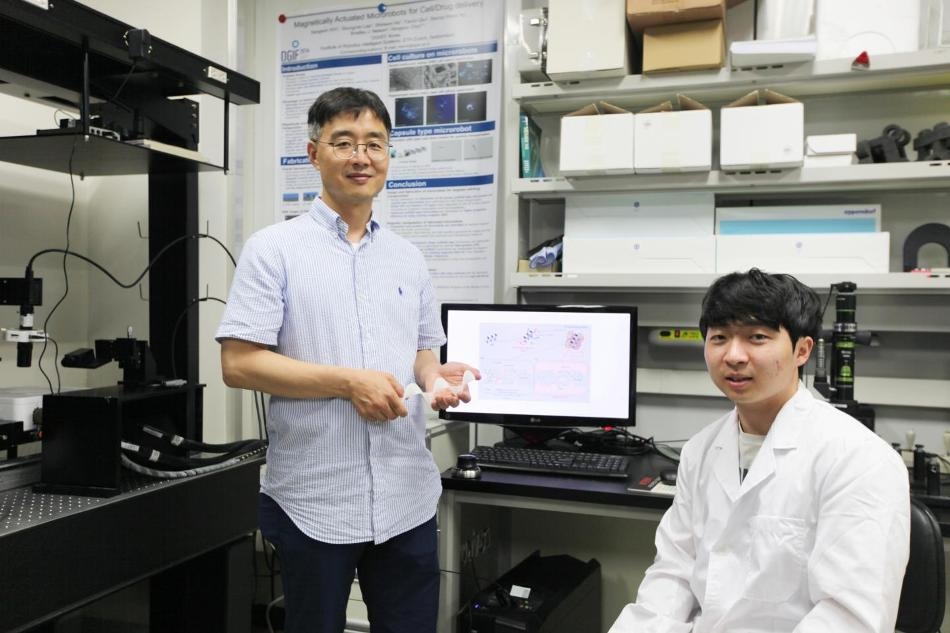Sep 4 2019
A biodegradable microrobot capable of carrying out hyperthermia treatment and regulating drug release has been successfully created by Professor Hongsoo Choi’s study team in the Department of Robotics Engineering and DGIST-ETH Microrobot Research Center (DEMRC) at DGIST (President Young Kuk).
 Professor Hongsoo Choi in the Department of Robotics Engineering (left), Combined degree student Jongeon Park (right) (Image credit: DGIST)
Professor Hongsoo Choi in the Department of Robotics Engineering (left), Combined degree student Jongeon Park (right) (Image credit: DGIST)
This research will enable the treatment of cancer cells through hyperthermia and controlled drug release more systematically and precisely. This approach is thus expected to increase the efficiency and safety of anti-cancer treatment.
Anti-cancer treatment is performed in different ways such as radiation, drug and hyperthermia, and medical surgery. Although drug treatment is the most typically used technique among them, it is hard to deliver a preferred amount accurately to a specific part because it greatly relies on the circulatory function of the body.
It is also challenging to deliver hyperthermia to a specific part regardless of its recent popularity because of little side-effects. To overcome these restrictions, Professor Hongsoo Choi’s research team at DGIST designed 3D bio-degradable microrobots that can hold drugs and magnetic nanoparticles with 3D laser lithography process.
To use a microrobot within the human body, it has to go through an in vivo degradation or retrieved after use to minimize other harmful effects. Consequently, the research team created a microrobot with a biodegradable polymer and engineered it to be biodegraded once it is fully used. It can also perform drug transport quickly and precisely through wireless control using an external magnetic field.
When a high frequency of alternating magnetic field is conveyed to the robot that reached a chosen part, the heat produced from the magnetic nanoparticles within the microrobot increase the neighboring temperature to carry out hyperthermia treatment on the specific area. A huge achievement of this study is allowing accurate drug release by regulating the exposure time and intensity of alternating magnetic field.
The researchers confirmed the substantial efficiency of hyperthermia treatment using microrobot on cancer cells cultured in vitro as well as the therapeutic effects of various drug release modes regulated by the alternating magnetic field.
We expect to improve the treatment of cancer through our research, enhancing the efficiency of cancer treatment and reducing side-effects. By continuously performing a follow-up research with hospitals and related firms, we will strive to develop microrobot-based precise treatment system that can be used in actual medical sites.
Hongsoo Choi, Professor, DEMRC
Jongeon Park, a master student in the Department of Robotics Engineering, participated in this research as the first author, while senior researcher Jin-Young Kim in the DEMRC participated in the study as the co-author, with support from the Ministry of Science and ICT and Ministry of Trade, Industry, and Energy. The research result was reported in the world-renowned international journal, Advanced Healthcare Materials on August 22nd, 2019.